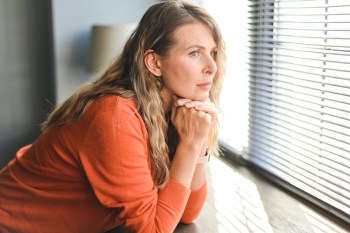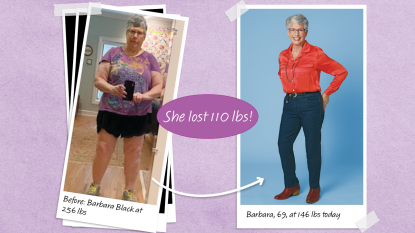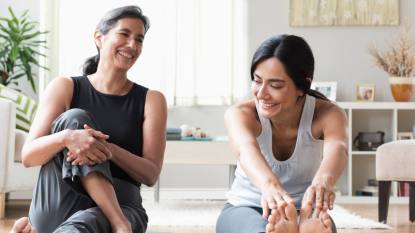Doctors Reveal Why Hemorrhoids Itch + the 3 Best Ways to Get Relief at Home
Find out if hemorrhoids can go away on their own, plus learn the warning sign that warrants a call to your doctor
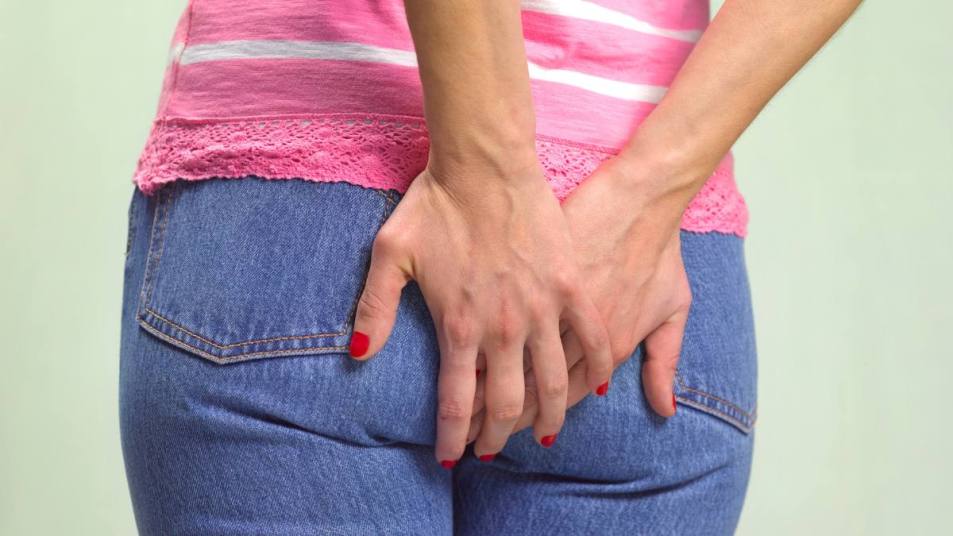
Have you ever been in the middle of getting a manicure when your nose starts to itch? Not scratching it can feel like torture. But when your rear is feeling itchy from hemorrhoids, stopping in your tracks to scratch likely isn’t an option. So, why do hemorrhoids itch? And what are the fastest ways to soothe symptoms? Read on to get to the bottom (no pun intended) of itchy hemorrhoids and the best doctor-backed remedies.
What are hemorrhoids?
“Hemorrhoids [also called piles] are a normal part of the anal and rectal anatomy,” says Kyle Eldredge, DO, a board-certified surgeon who specializes in general and colorectal surgery for Advanced Surgical Physicians in Wellington, FL. “They are a collection of veins in the layers of the wall of the anus and rectum.”
When most of us talk about hemorrhoids, we’re actually referring to when those veins become inflamed and swollen, says Ari Lamet, DO, a board-certified gastroenterologist at The Center for Gastrointestinal Disorders in Hollywood, FL. This happens when there is increased pressure in the anus and rectum. If the muscle fibers where the hemorrhoids are break down, symptoms can worsen, explains Dr. Eldredge.
“There are two different types of hemorrhoids – internal and external,” says Dr. Lamet. “Internal hemorrhoids are inside the rectum; you may not see or feel them. External hemorrhoids are around the skin near the anus and are more painful than internal hemorrhoids.”
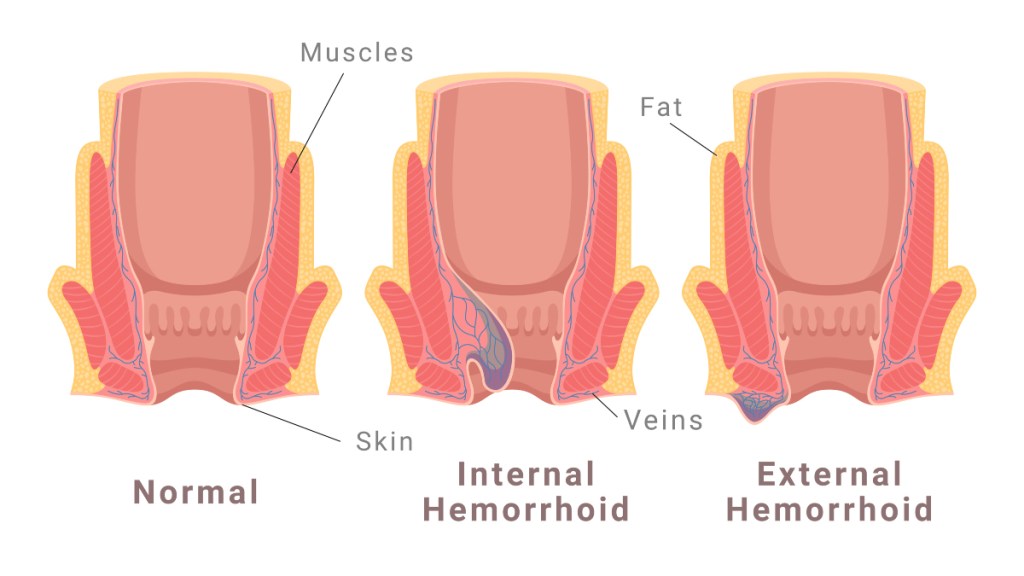
Some people have a higher risk of hemorrhoids
Hemorrhoids account for roughly 3.3 million outpatient medical visits in the U.S., according to a review in Clinics in Colon and Rectal Surgery. And folks between the ages of 45 to 65 years old are more prone to hemorrhoid flare ups. Aside from age, there are other risk factors that can up the odds of experiencing hemorrhoids. According to Dr. Lamet and Dr. Eldredge, they include:
- Pregnancy
- Sitting for long periods of time
- Lifting heavy objects
- Constipation (especially if you have a low-fiber diet)
- Straining during bowel movements
- Obesity
Related: Is Yogurt Good for Constipation? Yes — And So Are These 9 Other Foods
What hemorrhoids really feel like
The mere visual of hemorrhoids is unpleasant. And the symptoms that come with hemorrhoids unfortunately follow suit.
With internal hemorrhoids, Dr. Eldredge says symptoms include bright red blood in the stool or blood that drips into the toilet or on toilet paper after urinating and wiping. “Internal hemorrhoids are typically painless,” says Dr. Lamet. “The only time you may feel pain is if they prolapse [bubble] out of the rectum.”
External hemorrhoids cause more discomfort and that telltale bothersome itch. “You may have pain with bowel movements, a prolapse near the anus, itching and the feeling that you’re never getting fully clean after using the restroom,” says Dr. Eldredge. This type of hemorrhoid can also develop a blood clot called a thrombosed hemorrhoid, adds Dr. Lamet. “This can lead to severe and sudden pain in the rectal area,” he says.
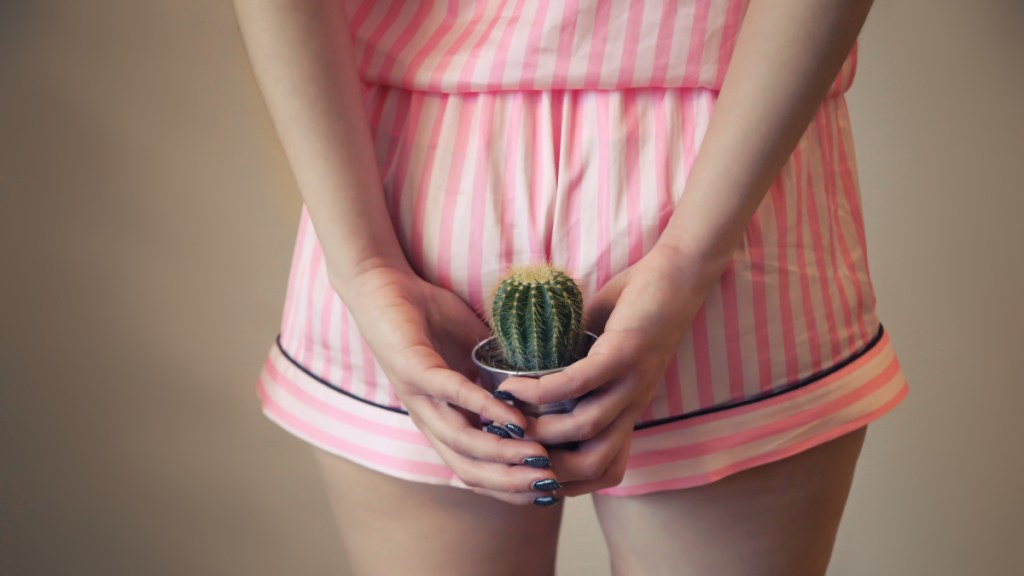
Why do hemorrhoids itch?
It’s bad enough to deal with the pain and discomfort of hemorrhoids when in the bathroom, but itchy hemorrhoids can leave you feeling uncomfortable outside of the restroom, too.
The top reason hemorrhoids itch is due to inflammation, says Dr. Eldredge. “Like any other area of the body, when there is inflammation, itching is a side effect of that,” he says. “Hemorrhoids can also alter the normal anatomy and environment. They can cause bleeding, increased moisture and leakage from the anal canal of either mucus or stool. This can cause even more inflammation and irritation, increasing itching with it.” (Click through to learn how onion peel tea calms body-wide inflammation.)
Can hemorrhoids go away on their own?
Now for some good news: “Hemorrhoids can go away, particularly mild flare-ups, without doing anything,” says Dr. Lamet. “But treating hemorrhoids will significantly help symptoms.”
As hemorrhoids decrease in size, so will the severity of your symptoms, such as pain, bleeding and that bothersome itch, says Dr. Eldredge. “If you are having symptoms, seek medical help early,” he says. “The sooner you seek treatment, the easier it may be to potentially treat hemorrhoids.”
How to treat itchy hemorrhoids at home
While it’s difficult to prevent hemorrhoids, there are a lot of things you can do at home to decrease the incessant itch and other pesky symptoms.
1. Fill up on fiber
“Eating a high-fiber diet will help with the bulk of your stool,” says Dr. Eldredge. This makes stool easier to pass and can help with constipation. For women under 50 years old, they should aim to eat 25g to 28 grams of fiber per day, and 22 grams for those 51 years and older. A high-fiber diet is one that consists of:
- Whole grains
- Beans and legumes
- Vegetables
- Fruits
- Nuts and seeds

If you’re concerned that you’re not getting enough fiber through your diet, Dr. Eldredge recommends a supplement like Metamucil (Buy from Amazon, $23.98) or Fibercon (Buy from Amazon, $15.84). (Click though to learn how a special type of fiber known as viscous fiber speeds weight loss, too.)
Tip: Drinking more water helps, too. Dr. Eldredge says this can help with constipation by softening stool. A clinical trial in Hepatogastroenterology found that those with chronic constipation who consumed 25 grams of fiber and drank about six to eight glasses of water had increased stool frequency, which reduced their need for laxatives.
2. Soak in a sitz bath
“A warm bath can reduce symptoms of inflammation and swelling,” says Dr. Lamet. And you don’t even need Epsom salt or any soap to do a sitz bath, adds Dr. Eldredge. To make a sitz bath, fill your tub with warm water high enough to submerge your pelvis. You can soak for 10 to 15 minutes up to four times a day.
“If it is difficult to get into a bathtub or you do not have a bathtub, there are toilet adapters you can use,” says Dr. Eldredge. These adapters are shallow basins that you can fill with warm water and place them on top of your toilet seat to help ease pain and relax the surrounding muscles. You can find generic adapters at your local drugstore. One to try: CVS Health Sitz Bath, (Buy from CVS, $27.79). Or consider a collapsible style for easy storage, such as Fivona Foldable Sitz Bath (Buy from Walmart, $25.75).
3. Reach for witch hazel
There are a few over-the-counter products that can soothe painful, itchy hemorrhoids. Dr. Eldredge recommends witch hazel, an astringent that calms the skin contract. Using a witch hazel wipe, such as Tucks Medicated Cooling Pads (Buy from Amazon, $7.68), or applying some with a cotton ball from a bottle like T.N. Dickinson’s Witch Hazel (Buy from Amazon, $3.99) can ease discomfort and help reduce inflammation and swelling.
For witch hazel wipes, place the wipe on the hemorrhoids for 15 minutes as often as needed. When using bottled witch hazel, you can soak a cotton ball with it and leave it on the hemorrhoid as you would a pre-moistened wipe.
Related: The #1 Hemorrhoid Soother Is Already In Your Medicine Cabinet: Witch Hazel
Also smart: Dr. Lamet suggests using a hemorrhoid cream for external hemorrhoids and a suppository for internal ones. For both, you can use them up to four times a day to relieve pain, burning, swelling and itching. (Many brands, like Preparation H, make both types, so double-check the label to make sure you’re buying the right formula for your needs.)
When to see a doctor
If you have bleeding with your hemorrhoids, both Dr. Eldredge and Dr. Lamet say it’s best to mention it to a doctor, even if you’re sure hemorrhoids are at the root of it. “Rectal bleeding shouldn’t be ignored because not all bleeding is caused by hemorrhoids,” says Dr. Lamet. “An occasional bout of bleeding after constipation or a recent colonoscopy isn’t cause for concern. But if it persists, it’s always a good idea to mention it to your doctor to rule out an underlying health issue.”
For more ways to soothe “down there” bothers:
Your Vagina *Does* Get Smaller After Menopause + The Lubricants Women Over 50 Should Never Use
Doctors Break the Silence on Stress and Diarrhea: What They Want You to Know
This content is not a substitute for professional medical advice or diagnosis. Always consult your physician before pursuing any treatment plan.






